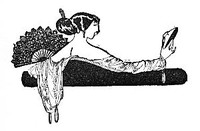The Hohenzollerns in America<br />With the Bolsheviks in Berlin and Other Impossibilities, Stephen Leacock [crime books to read txt] 📗

- Author: Stephen Leacock
Book online «The Hohenzollerns in America<br />With the Bolsheviks in Berlin and Other Impossibilities, Stephen Leacock [crime books to read txt] 📗». Author Stephen Leacock
With a last outburst of cheering the crowd broke and dispersed, like a vast theatre audience. On all sides were expressions of joy and satisfaction. "Excellent, wunderschoen!" "He calls us dogs! That's splendid. Swine! Did you hear him say 'Swine'? This is true German Government again at last."
Then just for a moment the burly figure reappeared on the balcony.
"A last word!" he called to the departing crowd. "I omitted to say that all but one of the leaders of the late government are already caught. As soon as we can lay our thumb on the Chief Executive rest assured that he will be hanged."
"Hurrah!" shouted Boobenstein, waving his hat in the air. Then in a whisper to me: "Let us go," he said, "while the going is still good."
We hastened as quickly and unobtrusively as we could through the dispersing multitude, turned into a side street, and on a sign from the count entered a small cabaret or drinking shop, newly named, as its sign showed, THE GLORY OF THE BRITISH COLONIES CAFE.
The count with a deep sigh of relief ordered wine.
"You recognized him, of course?" he said.
"Who?" I asked. "You mean the big working-man that spoke? Who is he?"
"So you didn't recognize him?" said the count. "Well, well, but of course all the rest did. Workingman! It is Field Marshal Hindenburg. It means of course that the same old crowd are back again. That was Ludendorf standing below. I saw it all at once. Perhaps it is the only way. But as for me I shall not go back: I am too deeply compromised: it would be death."
Boobenstein remained for a time in deep thought, his fingers beating a tattoo on the little table. Then he spoke.
"Do you remember," he said, "the old times of long ago when you first knew me?"
"Very well, indeed," I answered. "You were one of the German waiters, or rather, one of the German officers disguised as waiters at McConkey's Restaurant in Toronto."
"I was," said the count. "I carried the beer on a little tray and opened oysters behind a screen. It was a wunderschoen life. Do you think, my good friend, you could get me that job again?"
"Boobenstein," I exclaimed, "I can get you reinstated at once. It will be some small return for your kindness to me in Germany."
"Good," said the count. "Let us sail at once for Canada."
"One thing, however," I said. "You may not know that since you left there are no longer beer waiters in Toronto because there is no beer. All is forbidden."
"Let me understand myself," said the count in astonishment. "No beer!"
"None whatever."
"Wine, then?"
"Absolutely not. All drinking, except of water, is forbidden."
The count rose and stood erect. His figure seemed to regain all its old-time Prussian rigidity. He extended his hand.
"My friend," he said. "I bid you farewell."
"Where are you going to?" I asked.
"My choice is made," said Von Boobenstein. "There are worse things than death. I am about to surrender myself to the German authorities."
III.—Afternoon Tea with the Sultan A Study of Reconstruction in Turkey
On the very day following the events related in the last chapter, I was surprised and delighted to receive a telegram which read "Come on to Constantinople and write US up too." From the signature I saw that the message was from my old friend Abdul Aziz the Sultan.
I had visited him—as of course my readers will instantly recollect—during the height of the war, and the circumstances of my departure had been such that I should have scarcely ventured to repeat my visit without this express invitation. But on receipt of it, I set out at once by rail for Constantinople.
I was delighted to find that under the new order of things in going from Berlin to Constantinople it was no longer necessary to travel through the barbarous and brutal populations of Germany, Austria and Hungary. The way now runs, though I believe the actual railroad is the same, through the Thuringian Republic, Czecho-Slovakia and Magyaria. It was a source of deep satisfaction to see the scowling and hostile countenances of Germans, Austrians and Hungarians replaced by the cheerful and honest faces of the Thuringians, the Czecho-Slovaks and the Magyarians. Moreover I was assured on all sides that if these faces are not perfectly satisfactory, they will be altered in any way required.
It was very pleasant, too, to find myself once again in the flagstoned halls of the Yildiz Kiosk, the Sultan's palace. My little friend Abdul Aziz rose at once from his cushioned divan under a lemon tree and came shuffling in his big slippers to meet me, a smile of welcome on his face. He seemed, to my surprise, radiant with happiness. The disasters attributed by the allied press to his unhappy country appeared to sit lightly on the little man.
"How is everything going in Turkey?" I asked as we sat down side by side on the cushions.
"Splendid," said Abdul. "I suppose you've heard that we're bankrupt?"
"Bankrupt!" I exclaimed.
"Yes," continued the Sultan, rubbing his hands together with positive enjoyment, "we can't pay a cent: isn't it great? Have some champagne?"
He clapped his hands together and a turbaned attendant appeared with wine on a tray which he served into long-necked glasses.
"I'd rather have tea," I said.
"No, no, don't take tea," he protested. "We've practically cut out afternoon tea here. It's part of our Turkish thrift movement. We're taking champagne instead. Tell me, have you a Thrift Movement like that, where you come from—Canada, I think it is, isn't it?"
"Yes," I answered, "we have one just like that."
"This war finance is glorious stuff, isn't it?" continued the Sultan. "How much do you think we owe?"
"I haven't an idea," I said.
"Wait a minute," said Abdul. He touched a bell and at the sound of it there came shuffling into the room my venerable old acquaintance Toomuch Koffi, the Royal Secretary. But to my surprise he no longer wore his patriarchal beard, his flowing robe and his girdle. He was clean shaven and close cropped and dressed in a short jacket like an American bell boy.
"You remember Toomuch,





Comments (0)